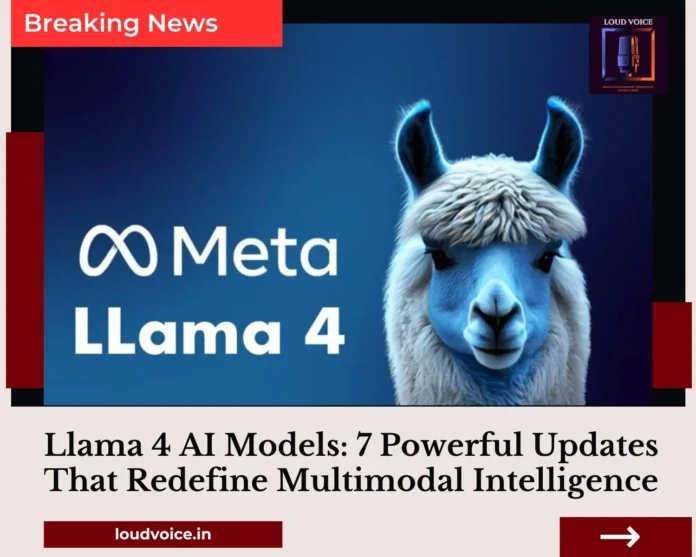Llama 4 AI Models: Introduction
In a strategic move to shake up the AI landscape, Meta has announced the launch of its next-generation Llama 4 AI Models—a release that signals the company’s ambitious bid to dominate the open-source AI race in the world of evolving technology. Touted as the most advanced and multimodal models ever developed by Meta, Llama 4 AI Models aim to outmatch rivals like Google’s Gemini and OpenAI’s GPT series across multiple benchmarks.
This new lineup includes Llama 4 Maverick, Llama 4 Scout, and a preview of the Llama 4 Behemoth, each designed to tackle specific AI challenges—from precise image comprehension to high-performance reasoning over code bases. Here’s what makes these models the center of attention in the AI world.
1. Multimodal Capabilities: A Quantum Leap in AI Integration
Meta emphasized that these are fully multimodal—capable of understanding and integrating text, images, audio, and video. According to the company’s announcement, these models are designed to seamlessly convert and reason across formats, bringing a unified intelligence layer to creative tasks, summarization, and dialogue.
The Scout and Maverick models are already being praised as the most advanced in their class, particularly in tasks requiring contextual understanding and cross-format synthesis.
2. Open-Source Commitment: Freeing the Future of AI
Meta confirmed that both Llama 4 Maverick and Llama 4 Scout will be released as open-source software, reinforcing its long-standing stance on democratizing access to AI innovation. Mark Zuckerberg noted that open-source models are beginning to take the lead, and with the Llama 4 lineup, that vision is becoming a reality.
This move could dramatically accelerate research, experimentation, and commercial applications, fostering global collaboration.
3. Llama 4 Behemoth: Meta’s Secret Weapon in AI Training
While only previewed for now, Llama 4 Behemoth is positioned as a “teacher model”—one that Meta claims could be among the smartest LLMs in existence. It’s expected to shape and improve the capabilities of future AI iterations by training smaller, more specialized models within the Llama family.
The AI community is watching closely, anticipating how this yet-unreleased model might impact long-term AI development and ethics.
4. Performance Benchmarks: Outclassing the Competition
Meta has boldly stated that Llama 4 Maverick outperforms Google’s Gemini 2.0 Flash in critical areas like reasoning, coding, long-context retention, and multilingual tasks. Meanwhile, Llama 4 Scout is reportedly more efficient than Gemini 2.0 Flash Lite and Gemma 3, particularly in summarization and document-level analysis.
These claims underscore Meta’s intention to dominate not just in performance, but in versatility and real-world applicability.
5. Technical Architecture: Built for Speed, Accuracy, and Scale
Meta shared technical specs that reveal just how powerful these models are under the hood. The Maverick version includes 17 billion active parameters and 128 experts, making it suitable for use cases like general assistance, creative writing, and precise image interpretation.
On the other hand, Scout boasts 109 billion total parameters and excels at reasoning over complex codebases, positioning it as an optimal model for developers and enterprise teams.
6. Infrastructure Expansion: Meta’s $65 Billion AI Bet
In response to the increasing demand for AI-driven solutions, Meta plans to invest up to $65 billion in expanding its AI infrastructure this year alone. This enormous budget reflects investor pressure to monetize AI innovation and build systems that rival—or even surpass—the likes of OpenAI and Google DeepMind.
This financial commitment is also a signal to the broader industry that AI at Meta is not just experimental—it’s foundational.
7. Industry Reactions: Congratulatory Messages and Strategic Tensions

Following the announcement, Google CEO Sundar Pichai congratulated the Meta AI team on X (formerly Twitter), writing, “Never a dull day in the AI world! Congrats to the Llama 4 team, Onwards!” The acknowledgment, though courteous, highlights the ongoing rivalry between tech giants as they compete for AI dominance.
Observers have also noted that Meta delayed the Llama 4 rollout due to technical benchmark shortcomings, particularly in math and humanlike voice interactions—a sign of how high the stakes and expectations have become.
Final Thoughts: Why the Llama 4 AI Models Matter Now More Than Ever
By releasing the Llama 4 AI Models, Meta is not just introducing more powerful algorithms—it’s redefining the boundaries of open-source intelligence, challenging proprietary giants, and backing its bets with billions in infrastructure.
Zuckerberg’s statement captures the vision clearly: the future of AI is open, collaborative, and universally accessible. With Llama 4 leading the charge, this future might be closer than anyone imagined.


